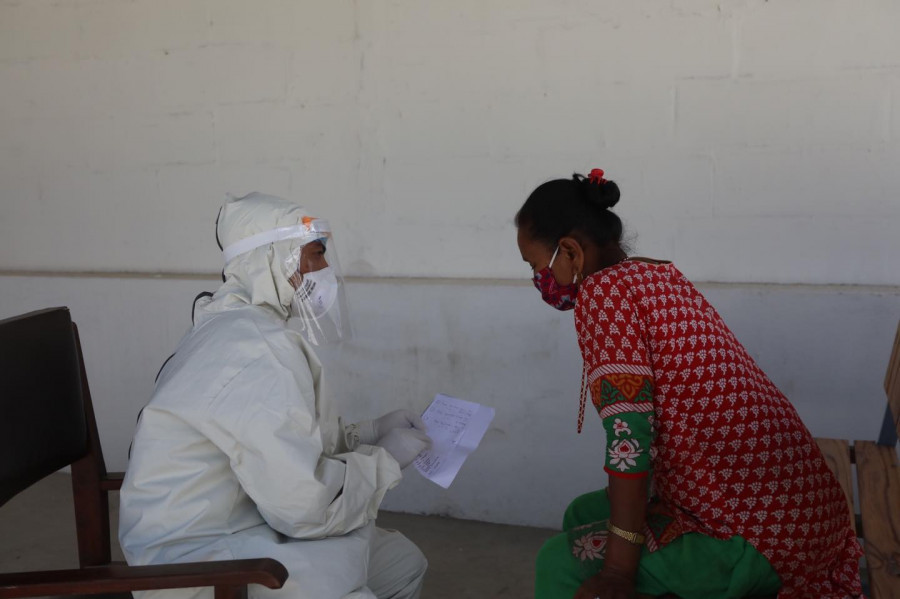Health
Mental health of Covid-19-infected people in home isolation not being monitored
Many people in home isolation suffer from anxiety and depression, experts say.
Arjun Poudel
Last week, a 22-year -old woman from Maitidevi, Kathmandu tested positive for Covid-19. The woman, who lives with her elder brother's family in a rented room, was worried she would transmit the infection to her eight months pregnant sister-in-law.
“The woman was thinking of self harm,” Kabin Maleku, programme head of Danfe Health Care, an organisation that provides telephone triage to Covid-19-infected people staying in home isolation, told the Post. “Our clinical psychologists counselled her and told her ways to set up isolation at home. We have been following up on her condition everyday.”
Another woman in her mid 30s, who tested positive last week, has been sent to hospital, as her condition deteriorated. The woman had tested positive the same day her 65-year-old father died of Covid-19.
“The woman was depressed and could have harmed herself,” Maleku, told the Post. “Our nurses counselled her for several hours in the night and sent her to the hospital in the morning after being attended to by a psychiatrist.”
Psychiatric and clinical psychologists attending to people infected with Covid-19 say many infected people staying in home isolation suffer from anxiety and depression- related problems such as sleeplessness, negative feelings, palpitation, burning sensation, restlessness, trembling, dizziness, numbness, fearfulness, suicidal thoughts and others.
But authorities concerned are not catering to the mental health needs of infected people, public health experts say that. It doesn’t require a big investment to do so, they say.
“The ongoing pandemic has exacerbated existing mental health problems in society,” Dr Basudev Karki, consultant psychiatrist at Nepal Mental Hospital, said. “While some people have lost their job, others have incurred huge losses in business or are scared after losing their dear ones. The number of infected people seeking mental health treatment has also increased significantly.”
A nation-wide study on mental health problems carried out by Nepal Health Research Council, showed that 10 percent of the respondents above 18 suffer from some form of mental health problems. The study carried out on 9,200 people from January 2019 to January 2020 showed that 5.2 percent adolescents from 13 to 17 also live with some kind of mental health problems.
With the new cases spiking at an alarming rate in Kathmandu Valley, isolation facilities in hospitals have been overwhelmed, and infected people are forced to isolate themselves at home.
As of Tuesday 76,258 people have tested positive for Covid-19 in the country and 491 have died due to ailments related to the disease. During the last 24 hours, 1,513 people have tested positive with 934 cases reported in the Kathmandu Valley alone. According to the Ministry of Health and Population, 6,447 people are in home isolation in Bagmati Province, most of them in the Valley.
“As no one is monitoring the health condition of the infected people placed in home isolation, we have started the services to show that it is doable,” Dr Prabhat Adhikari, an advisor to Danfe Health Care, told the Post. “Around 15 percent of the infected people need medical intervention, but we do not know who they are. Authorities should also start providing this type of service, which is not very expensive and can save many lives.”
By using telephone and internet, services such as Danfe Health Care have been monitoring the health of 150 infected people. Consultant doctors, clinical psychologists and other medical professionals monitor the condition of the infected thrice a day. Patients can contact the doctors at any time they need help. But they too have limited resources at their disposal.
“Some people need immediate care. If not provided immediate care, some people could kill themselves,” Salikram Bhattarai, a clinical psychologist, told the Post.
Meanwhile, Nepal Mental Health Hospital started a helpline (which can be reached on ‘1166’) three weeks ago. But only a handful of people are aware of such services.
“We don’t have dedicated staff for the hotline service,” said Karki. “I think many people are not aware about the service and we too have not been able to tell the public about the service.”




 18.12°C Kathmandu
18.12°C Kathmandu















